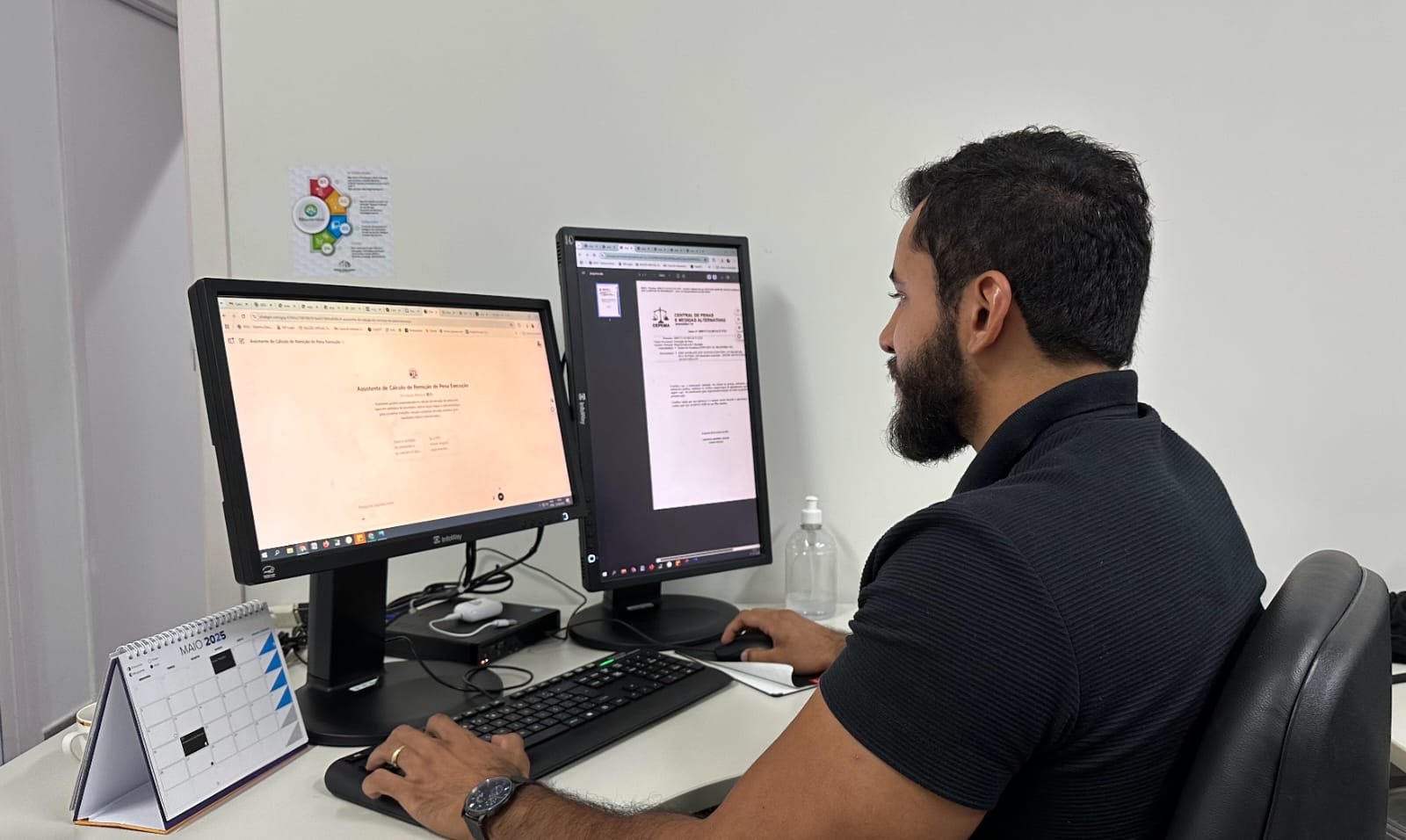
The application of artificial intelligence (AI) in the activities of the Judiciary of the state of Tocantins could help to make the work of the Penal Execution Courts faster, safer and more efficient in a delicate area: sentence remission.
Ulysses Barbosa, who works in the District Court of Araguaína, has created a virtual legal assistant with AI that automatically calculates the days of sentence remission, based on the activities carried out by people deprived of their liberty. He explains that this type of calculation takes time and requires extra attention from the staff, but now it can be done in seconds, thanks to his contribution.
Sentence remission is the right that a person in a prison unit has to reduce their prison time by proving that they have participated in activities such as work, study or reading during their time in prison. Correct calculation is essential if the sentence is to be served fairly and in accordance with the law.
The technology is based on the ChatGPT platform, in which the server has programmed the assistant to simulate the calculations according to the rules of the Penal Execution Law (LEP), as well as following the administrative rules and specific projects of the district itself.
“I did some training offered by the Superior School of the Judges of the State of Tocantins (Esmat) and, after studying more in depth, I saw that it would be possible to develop this AI legal assistant. It was a way of contributing to the day-to-day running of the penal system, bringing more agility, security and confidence to the civil servers and magistrates who work in this area," explains Ulysses.
Judge Gisele Pereira de Assunção Veronezi, head of the 3rd Criminal Court of Araguaína, praises the initiative. "We are experiencing a truly inspiring milestone. This tool is not just a ‘robot’, but a solution designed with a deep understanding of the needs of our system. It doesn't replace human labor, but acts as a powerful ally, freeing up our professionals for more strategic tasks."
The magistrate emphasizes the importance of solutions like this to improve the justice system. "This innovation represents a leap in quality. The time that is wasted on repetitive tasks can now be used to guarantee fairer and faster decisions. The application of this AI is a watershed for the Judiciary.”
Tool inovation and compliance
To use the tool, all you have to do is send the certificate of the activities of the inmate - be it study, work or reading - and the system automatically generates a report with the days served, ready to be reviewed and added to the file.
The server explains that the use of the tool is in full compliance with data protection legislation. The sending of certificates by civil servers, for example, is supported by the articles of the General Data Protection Law (LGPD) and the Resolution No. 615 of the National Council of Justice (CNJ), which does not interfere with the normal routines of penal execution, such as sentence remission calculations, says Ulysses. According to Ulysses, the idea is to support public servers, not replace them.
“Innovation in the Judiciary should always have this purpose: to bring people closer together, to humanize and to guarantee rights more efficiently. The intention has never been to take away the work from anyone, but rather to provide tools that help civil servers, reduce the risk of mistake and make the system fairer.”
The assistant can now be used free of charge by any interested server. Just go to the link.
Magistre and server highlight the importance of the "robot"
Calculating sentence remission can be a challenge in Criminal Courts. This is because there are several different rules, depending on the activity carried out by the inmate, and there are also variations according to the local projects of each District. This scenario often causes confusion and even mistakes in the calculations, which harms the progress of the process and can delay the granting of rights to prisoners.
With the AI assistant, these rules are applied automatically. And if there is any doubt or missing information, the system alerts the user, asking for the necessary data before completing the calculation. This gives more security to the work of the server, who now only needs to review the final result, already formatted and explained clearly, says the judge.
“This ‘robot’, if we can call it that to facilitate popular understanding, is actually a sophisticated technological solution, the result of a deep understanding of the intrinsic needs of our system and exemplary dedication. It does not emerge as a substitute for human intellect, but as a powerful ally, capable of processing massive volumes of information with previously unimaginable agility and precision, optimizing flows, identifying complex patterns and, fundamentally, freeing up our valued professionals to dedicate themselves to the more strategic nuances and judicious judgment that society expects and deserves”.
Judge Gisele sums up the progress. "By equipping the Courts with technologies like this, we are strengthening the Rule of Law and making the provision of justice more efficient and accessible. It's a legacy of innovation that deserves to be replicated."
For the creator of the robot, the technology brings humans and machines closer together with a view to make the Judiciary more efficient. "I really believe that innovation in the Judiciary should always have this purpose: to bring people closer together, to humanize and to guarantee rights more efficiently.”




